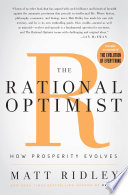Part 2
The Amazing Story of Human Progress: Sharing is Caring (and Makes Us Rich!)
Imagine a world where everyone had to make everything themselves! You'd have to grow your own food, build your own house, make your own clothes, and even create your own tools. It would be incredibly hard work, and you probably wouldn't have much time for anything else. That's the world our ancestors lived in for a very long time. But then, something amazing happened: people started sharing things with each other. Matt Ridley's book, "The Rational Optimist," explains how this simple act of sharing – what he calls "exchange" – is the secret to all the amazing progress we've made as humans.
Think about your favorite things: your phone, your video games, even your comfy bed. All of these things are the result of countless acts of sharing. Someone invented the wheel, someone else figured out how to make better roads, someone else invented electricity, and so on. Each invention built upon the last, like a giant LEGO castle where each person adds their own special piece. This isn't just about inventions; it's about sharing *ideas* too. Scientists share their discoveries, artists share their creations, and teachers share their knowledge. This constant sharing of knowledge is what propels human progress forward.
Ridley uses the example of the potato to illustrate this point. Imagine life before the potato. For many people in Europe, food was scarce. But then, the potato arrived from South America, and suddenly, people had a new food source that could feed many more people. This wasn't just about the potato itself; it was about the *exchange* of the potato – sharing it with different parts of the world. This simple act of sharing led to a huge population boom.
He also explains how specializing in different jobs makes us much more productive. Imagine a village where everyone tries to do everything. One person tries to farm, build houses, make clothes, and everything else. They'd be terrible at everything! But if people specialize – one person becomes a farmer, another a builder, another a tailor – they can become incredibly good at their job. Then, they can *exchange* their goods or services. The farmer gets clothes from the tailor, and the builder gets food from the farmer. Everyone benefits! This is called the "division of labor," and it's incredibly powerful. It's like a relay race: each person does their part, and together, they achieve something amazing.
Think about building a magnificent LEGO castle. If one person tries to build the whole thing alone, it would take forever and probably wouldn't look very good. But if you have a team, where one person specializes in building the towers, another the walls, and another the drawbridge, you'll build a much better castle, much faster. That's the power of specialization and exchange!
But exchange isn't always easy. It requires trust. If you don't trust the farmer to give you bread in exchange for your clothes, you won't trade. This trust is built over time through laws, social interactions, and strong institutions. A society with strong rules and trust will see much faster progress than one without. It's like buying something online; you need to trust the seller and the payment system. Otherwise, you won't make the purchase.
Ridley shows how even seemingly bad things, like wars, can sometimes lead to progress. During wars, countries often share knowledge and technology with each other, even with their enemies. This sharing of knowledge can lead to unexpected advancements after the war ends. It's like a forced exchange of ideas, resulting in progress in the long run.
The book is full of amazing stories – from the development of agriculture to the invention of the internet – showing how each step forward is built upon previous exchanges of goods, services, and ideas. It's a powerful reminder that progress isn't just about luck; it's about the amazing power of sharing and collaboration.
Lesson
The key lesson from "The Rational Optimist" is that human progress isn't about individual genius alone, but about the collective power of exchange – sharing goods, services, and ideas. By specializing in different tasks and trading with each other, we create a system of incredible progress and prosperity. Trust and strong institutions are crucial for this system to work effectively.
